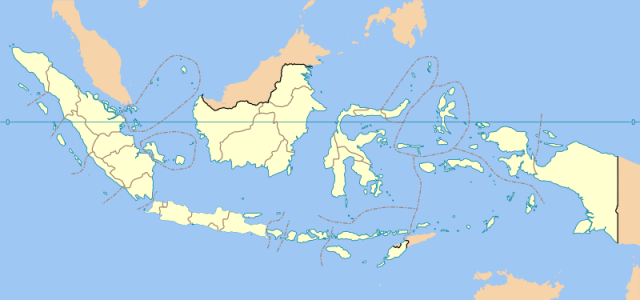Indonesia
Area 741,110 square mi (1,919,440 square km)
Population 254.5 million 2014
Capital Jakarta
Highest Point 16,502 ft (5,030 m)
Lowest Point 0 m
GDP $888.5 billion 2014
Primary Natural Resources petroleum, natural gas, nickel, copper.
COMPOSED OF 17,000 islands, Indonesia is the world's sixth-largest nation and the world's largest archipelago, stretching over 5,000 mi (8,047 km) along the equator. It lies southeast of the Malay Peninsula and Indochina. AUSTRALIA is due south and the PHILIPPINES lie to the north. About half the population lives on the island of JAVA where the capital, JAKARTA, is located. The island of BORNEO is shared with MALAYSIA, while New Guinea is shared with PAPUA NEW GUINEA. Other larger and populated islands are SUMATRA and Sulawesi.

EARTHQUAKES AND TSUNAMIS
Because of its location on the edges of tectonic plates, Indonesia is prone to earthquakes, which cause TSUNAMIS (as exemplified in the 2004 tsunamis that violently hit the island of Sumatra). Indonesia also has many volcanoes. Terrain of the islands varies and includes mountains, rainforests, and miles of beaches. The country has a hot, humid tropical climate, with a more moderate climate in the highlands.
There are two seasons: the dry season from June to October, and the rainy season from November to March. It is hot all year round, although coastal regions are cooler. Indonesia is home to a wide variety of flora and fauna. Elephants, tigers, leopards, and orangutans live there, as well as sea turtles and Komodo dragons. The world's largest flowers grow in Sumatra. Unfortunately, rainforests are rapidly disappearing from the region.
Indonesia's history has added to its rich diversity of culture. From the 7th to the 14th century, Hindus and Buddhists formed several kingdoms on these islands. Arab traders later introduced Islam. In the early 16th century, Europeans in pursuit of the spice trade arrived. By the 17th century, the Dutch were the dominant colonial force in the region. Indonesia was still under Dutch rule when World War II broke out.
During the war, Japan conquered and occupied the Dutch colony. They found the Indonesian elite to be cooperative and several were decorated by the Japanese emperor in 1943. After the war, a group led by Sukarno declared the country's independence. The Dutch attempted to quell the independence movement and regain control of Indonesia. After several years of bloody fighting, the Dutch accepted Indonesia's independence.
Sukarno was the first president. His government, now called the Old Order, saw military conflict with British Malaya and economic difficulties at home. In 1967, Army General Suharto took over, saying he could secure the country against an alleged coup attempt by communists. His 32-year reign is known as the New Order. Suharto's corrupt regime brought wealth to himself and his family, and he was forced to step down in 1998 after massive popular demonstrations against him. During the next three years, the
country had three presidents. In 2004, Susilo Bambang Yudhoyono was elected president.
The culture of Indonesia has been influenced by its many immigrants. Most Indonesians are of Malay or Polynesian descent. The population also includes significant numbers from INDIA, CHINA, SAUDI ARABIA, IRAN, and Europe. The official language is Bahasa Indonesia, but English, Dutch, and local dialects are
widely spoken as well.
Indonesian art shows influence of other cultures. Javanese and Balinese wayang kulit shadow theater shows are popular, as are famous Javanese and Balinese dances. Some islands are famous for their batik and itak cloth. The unique martial art of Silat originated in Indonesia. Indonesia is primarily a Muslim nation, but religious tolerance is widespread. Muslims account for 88 percent of the population, with 8 percent Christian, 2 percent Hindu, and 1 percent Buddhist.
NATURAL RESOURCES
Indonesia is blessed with a number of natural resources. The country is the second-largest exporter of natural gas. Other natural resources include gold, copper, tin, and oil. Indonesia's agricultural products include rice, tea, coffee, spices, and rubber. The UNITED STATES, JAPAN, SINGAPORE, Malaysia, and Australia are Indonesia's major trading partners. Agriculture or farming accounts for 45 percent of the workforce, while 16 percent work in industry, and 39 percent in service industries.
Indonesia faces many problems, both economic and social. The judicial system does not function well and the banking system is weak, making Indonesia a poor climate for foreign investment. There are ongoing threats against Western interests in Jakarta. The 2002 terrorist bombing of the Sari nightclub and a bomb explosion outside the Australian embassy in 2004 add to the unrest. Poverty is a problem, particularly in Jakarta. About 27 percent of the people live below the national poverty level.